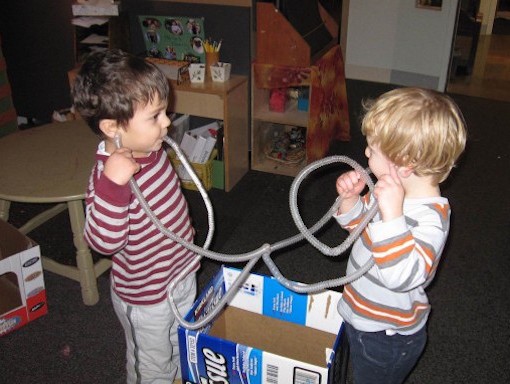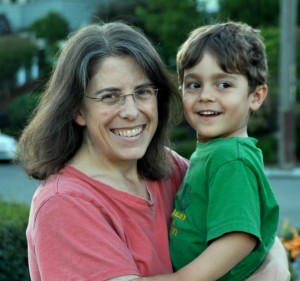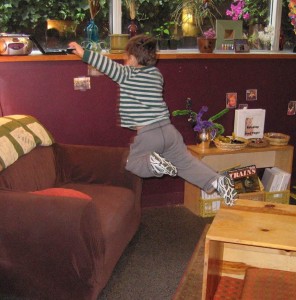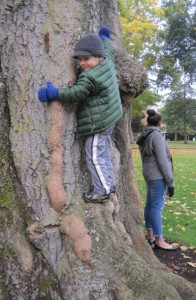
“When you’re a parent, you’ll understand”
by Sarah Felstiner, Curriculum Director, Hilltop Children’s Center
Ouch.
When I was starting out in this field, I found it insulting and painful to hear from colleagues, or from families of children in my class, that I “didn’t understand” young children, because I wasn’t a parent. Insulting, because I was working extremely hard to care for a large group of children every day. And painful, because I wondered whether in some sense that comment might be true.
I was 16 years old when I began teaching young children in group care. I went on to study child psychology and educational theory in college and grad school, while working in a variety of childcare programs. I became a confident educator: designing environments and activities, supporting a thriving classroom, and tending to the intellectual development of each child. Despite all this training and experience, I still bristled at the assertion that there might be something missing from my skillset or understanding, because I hadn’t parented a child of my own.
And then, after working in classrooms for over twenty years, I had a kid. Suddenly I gained a new understanding of how soul-crushingly exhausting parenting can be. I recognized how differently a child might react or behave at home and at school. I began practicing the near-impossible juggling act of being a working parent. And I developed a deeper compassion for what a leap of faith it is to ever let your child out of your arms.
“Making the decision to have a child – it is momentous. It is to decide forever to have your heart go walking around outside your body. ” – Elizabeth Stone
I also realized that for years I’d been judging families as incapable of appreciating the experience of being a teacher. I used to wonder whether families understood what it’s like to keep our attention tuned to an entire room full of children? We’re monitoring health, safety and comfort, while also staying alert to opportunities for growing curriculum, documenting learning, and supporting development. Do families know how we mentally fortify ourselves for each day, and then exhaustedly empty Lego pieces and half-eaten crackers from our pockets when we get home? Do they recognize what it takes to fall in love with a dozen or more children each year, invest deeply in their personal growth, and then release them into the world?
And so I believe that both stories are true. Early Childhood Educators can be phenomenal and effective whether or not they have children of their own. And having children of one’s own can change your perspective as an Early Childhood Educator.
We must acknowledge the expertise of educators, who have worked with hundreds of children and know a great deal about their development and care. And we must acknowledge the wisdom of family members who are, quite literally, the world’s leading experts on their own children. And we must rely on each other’s capacity for empathy and understanding, whether or not we’ve actually walked in the other person’s shoes.
This is why close collaboration between educators and families is so critically important. The educators of Reggio Emilia propose an image of the school as a three-legged stool, supported by the three key players: children, families, teachers. If any of these parties is under-represented or missing – from the planning, the pedagogy, the curriculum – then the whole enterprise collapses. When compassion and understanding flows both directions between families and educators, this kind of collaboration is possible.
At Hilltop Children’s Center, where I’ve gotten to be both a parent and an educator, we have worked to design many structures and opportunities to bring families and educators into supportive, effective, meaningful partnership.
- At the start of each year, we hold a meeting for all families who are new to the school, to describe our pedagogy and discuss ways they can get and stay engaged with their child’s school experience.
- All the families from each classroom meet for a “Fall Family Gathering” in which they take up a question or topic to study together, and begin building habits for learning about and contributing to the class curriculum.
- Each family is paired with a “primary contact teacher” from their child’s classroom, who will stay in regular touch with them, as the liaison between life at home and life at school.
- Each family meets with their “primary” in the fall, to share information about their family, and to describe their hopes and wishes for the coming school year, and again in the early spring, to review together how the child seems to be doing across a range of developmental areas. Families prepare for this “Mid-Year Conference” by studying the same set of learning domains and prompt questions that educators use. Then the educator and the family meet to share and compare notes, and together craft a snapshot of where that child is thriving, and where more support may be needed.
- Educators seek opportunities to chat informally with families at the beginning and end of each day, to share information and build relationships. And each classroom publishes a weekly blog to share stories from that week, as well as information and possibilities for the week to come.

- Educators write longer pieces of “Pedagogical Documentation” every week, which go more deeply into the possible meanings of play we observed, and our plans for what we might offer children in response. Educators also write “Learning Stories” about experiences of a specific child that might describe a new milestone, discovery, struggle, or triumph. These write-ups include questions or prompts to families, so that they can respond and share their perspective.
- These stories are posted on each classroom’s “Curriculum Board” and also copied and filed into individual “Journals” for each child. These journals belong to those children and their families, and can travel back and forth from school to home.
- When educators facilitate a longer-term “In-Depth Investigation” with a group of children, they always meet with the families of those children as part of the investigative process. These meetings bring families directly into the work of thinking through and planning for the curriculum, and offer both families and educators new perspectives on each child, in the context of group work.

When my own child was old enough to come to Hilltop, I got to experience all of these opportunities from the parent side. There were days when I was mortified…I’d catch myself doing one of those “parent things” that used to drive me nuts as an educator, or notice that I wasn’t taking the time I should to follow the news of what was going on in my son’s classroom. I was repeatedly humbled when my tricks-of-the-trade fell completely flat with my own kid. But mostly, I was floored by the skill and sensitivity of my child’s teachers.
When Emily hosted a Collaborative Conference about my son’s study of Scary Things, I was offered a whole new view of my child’s resilience and leadership. And when Ellie wrote a learning story about his measurement work with Unifix cubes, I first came to understand my child as a mathematical thinker – a trait that continues to this day. Some of my son’s teachers had children of their own, and some did not…but all of them had valuable perspectives to offer me, and all of them brought their particular set of experiences and dispositions to their work. I am so grateful for the wisdom of these educators, and for Hilltop’s commitment to building meaningful partnerships between teachers and families.
[author] [author_image timthumb=’on’]https://hilltopcc.com/wp-content/uploads/2016/01/Sarah-Felstiner-photo-square.jpg[/author_image] [author_info]Sarah Felstiner is the Curriculum Director at Hilltop Children’s Center, where she has worked since 1995.[/author_info] [/author]
4 thoughts on ““When you’re a parent, you’ll understand””
Comments are closed.

This is such a valuable discussion of the natural tension between the roles of parents and teachers. The description of your extensive approach to family partnerships is inspiring. And the celebration of the complex work of teachers is so needed in our profession. Thanks Sarah for your understanding and articulate personal and professional words that help us see these important, deeply felt experiences.
This is such an important discussion topic that you have captured so well. Thanks for posting.
What an important and approachable reflection. Thank you for honoring all different sides of this experience and showing how “both stories [can be] true”! This is an area where teachers and parents both can always work to do more, and can also rest assured knowing that, by being themselves, they are doing enough.
Sarah, thank you for this beautifully written piece. It’s a great reminder to me as a teacher to value and strive towards collaboration with families when appropriate, and to remember that we’re all “doing our best” every day.